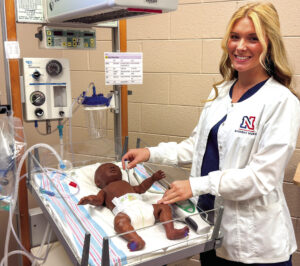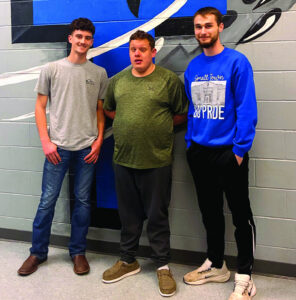Helping to heal ‘one person at a time’
Sixteen years ago, Amy Grimes had hit a low point in her life. Praying to God, she made a vow that if she made it through, she would use her story to help other women facing similar strife.
She didn’t know it then, but this would be the beginning of Holos Hope, a non-profit dedicated to providing freedom, restoration and purpose to female victims of domestic abuse and human trafficking.
Around 2011, Grimes re-enrolled at the University of North Alabama to complete the bachelor’s degree she’d started pursuing some years earlier. She had a clear plan and knew she wanted to work with women, but as she began work for her master’s degree, she said a professor introduced her to a concept that changed the trajectory of her career.
“One of my favorite professors in grad school introduced me to play therapy,” she explained. “So, I did my internship and practicum and got a job after that at the Child Advocacy Center — (with) another non-profit that doesn’t exist anymore — working with children who had been abused. I hate to say that I fell in love, but that became a very strong passion of mine.”
By the summer of 2016, Grimes opened her own private practice in Florence alongside her mother. She continued serving children, focusing on play therapy — a form of psychotherapy that allows children to express themselves and work through their emotions through creative and challenging activities — and equine therapy.
Still, Grimes said she couldn’t shake the feeling that she needed to be doing more for women.
“I think because I had hit that low point, I just wanted to find purpose as to why my life was where it was,” she said. “I knew I wasn’t going to cure cancer or anything like that, but I wanted to make a difference. If I could help one person at a time find healing, hope and restoration, then it would make all that hard (time) in my life worth it.”
Near the end of 2021, Grimes admits she was experiencing burnout.
“I hear a lot of hard stories, and I just kind of had this thought, ‘God, what am I supposed to do with my life?’ I know that these children are part of it, but I was burned out and worn out,” she said. “I still knew that my calling was to be a therapist. There was no question or doubt about that in my mind.”
The following February, Grimes had coffee with a friend. She said the topic of human trafficking came up.
While she had seen the issue in headlines and read up on statistics of cases in the U.S., Grimes said she’d never given it much thought. After that conversation, she said it was all she could think about.
“Within a week, I felt I had this very clear vision of what God was calling me to do,” she said.
Searching for guidance, Grimes said she found Thistle Farms in Nashville, Tennessee. One look at its program and she said she knew she wanted to create something similar in her hometown.
Though she said it felt like starting from scratch, with the help of Thistle Farms, Holos Hope, a temporary residence for victims, opened on Jan. 8, 2023.
With a capacity of five, Holos Hope is currently housing three survivors, Grimes said. Since the home opened its doors, it has served a total of 18 women.
Women who are referred to the program have access to therapy and job training during their stay, Grimes added.
“They’re not just getting a safe house and food to eat. They’re getting an education, and they’re getting medical and dental care, financial classes and employment opportunities,” she said. “It’s changing the whole trajectory of their lives.”
Of course, providing those services comes with a hefty price tag. On average, Grimes said it costs about $40,000 per woman per year to operate. To date, she said Holos Hope hadn’t received grant funding, but rather, relies on the help from donors and sponsors.
With a mission to become a self-sufficient facility, Grimes said she and her team, along with the survivors benefiting from the program, opened an up-scale consignment shop called Thistle & Pear.
“We actually opened one at our main office. We would hold it a couple of times a month, but because of the donations we got for it, we quickly outgrew that space,” Grimes added.
With a newly acquired space in downtown Florence, Grimes hopes to open the consignment shop sometime later this year. Along with the consigned items, Grimes said the store will also sale items like jewelry, soaps and lotions, artwork and other craft handmade by the survivors.
“All profits from the store go directly into the program,” Grimes said. “It doesn’t go to paying staff; those funds go right back into providing the services for our girls.”
While the new storefront takes Holos Hope one step closer to becoming self-sufficient, Grimes added another benefit she didn’t quite expect. Just as she used play therapy to help children in her former practice, Grimes and her team of assistants and therapists have also found that the creative outlet for the survivors also helps them to cope with their trauma.
Some of the survivors have even created their own brands as they explore the crafts and artforms they are most drawn to. Grimes said the clients will sell “Beautifully Broken” Kintsugi pottery — a Japanese practice of repairing broken pottery or ceramics with gold lacquer to highlight cracks and imperfections rather than conceal them.
Another client at Holos Hope is also selling her own line of body care products called “Alabaster Bath & Body.”
“Having the store allows them to give back to the program, but also it helps them to see more of their purpose and their worth,” Grimes said. “For them to see something they made be purchased in a store, I think it just gives them confidence. They do have talent. They are seen for the gifts they have.”








